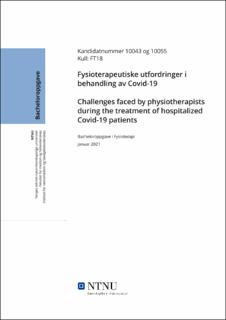| dc.contributor.advisor | Rømmen, Kathrine | |
| dc.contributor.author | Hellan, Lars Håkon | |
| dc.contributor.author | Korsvoll, Marthe | |
| dc.date.accessioned | 2021-09-25T16:28:01Z | |
| dc.date.available | 2021-09-25T16:28:01Z | |
| dc.date.issued | 2021 | |
| dc.identifier | no.ntnu:inspera:67905760:68151621 | |
| dc.identifier.uri | https://hdl.handle.net/11250/2783136 | |
| dc.description.abstract | Tittel: Fysioterapeutiske utfordringer i behandling av Covid-19
Hensikt: Å undersøke Norske fysioterapeuters utfordringer i behandlingen av Covid-19 pasienter for å belyse erfaringer og læringsprosesser som kan være relevant for fremtidig arbeid.
Problemstilling: Hvilke utfordringer har fysioterapeuter i møtet med Covid-19 pasienter innlagt på norske sykehus, og hvilken betydning kan fysioterapi ha på behandlingsforløpet?
Metode: En kvalitativ studie. Det ble innhentet data fra fire semi-strukturerte intervju.
Resultat: Resultatene viser blant annet at smittevernhensyn og stor usikkerhet ga utfordrende arbeidsforhold på sykehus. Behandlingen for Covid-19 pasienter ble utviklet gjennom «prøving» og tett oppfølging, da fysioterapeutene manglet forskning og erfaring om sykdommen og pasientforløpet. Fysioterapeuter har vist seg å være viktige i behandling av denne pasientgruppen, da mobilisering, leiring og etablering av en pasient-terapeut relasjon har vært viktige tiltak. Informantene antar at dette vil være en stor pasientgruppe med behov for rehabilitering etter avsluttet sykehusbehandling.
Konklusjon: Utfordringene i møte med Covid-19 førte til en læringsprosess for fysioterapeuter. Fysioterapeuter har hatt en viktig rolle i behandlingsforløpet av Covid-19 fordi dosering av mobiliseringstiltak, leiring av pasienter og etablering av en god pasient-terapeut relasjon har vært viktige tiltak. Tverrfaglig samhandling var viktig for utviklingen av tiltakene. Som et resultat av Covid-19 pandemien har behovene til post-intensive pasienter blitt satt mere på agendaen. | |
| dc.description.abstract | Title: Challenges faced by Norwegian physiotherapists during the treatment of Covid-19.
Aims: This thesis aims to gain insight into the experiences of Norwegian physiotherapists during the early treatment of Covid-19, and how these can inform future physiotherapy treatment approaches for the disease.
Research questions: What challenges did physiotherapists face during the hospitalization of Covid-19 patients, and what role does physiotherapy play during the course of treatment of this group?
Method: A qualitative study. Data was collected from four semi-structured interviews.
Results: The use of personal protective equipment (PPE) and personal uncertainty affected working conditions. There was a lack of both research and experience with Covid-19 in the early stages of the pandemic, and treatment was developed by closely monitoring the effect of various methods. Physiotherapists played an important role in patient care through active and passive mobilization and establishing a patient-therapist relationship. The informants expect that hospitalized Covid-19 patients may have a need for comprehensive rehabilitation.
Conclusion: Confronting the challenges during Covid-19 treatment resulted in a learning process for physiotherapists. They played an important role with treatment methods such as correctly dosed active and passive mobilization and establishing a patient-therapist relationship. These methods were important both during patient care and to reduce the risk of long-term consequences of hospitalization. Interprofessional co-operation was important for the development of such treatment methods. The Covid-19 pandemic has resulted in an increased awareness of the rehabilitation needs of post-intensive care patients. | |
| dc.language | nob | |
| dc.publisher | NTNU | |
| dc.title | Fysioterapeutiske utfordringer i behandling av Covid-19 | |
| dc.type | Bachelor thesis | |
